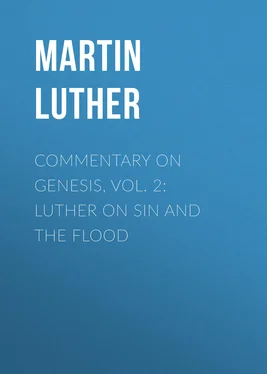Martin Luther - Commentary on Genesis, Vol. 2 - Luther on Sin and the Flood
Здесь есть возможность читать онлайн «Martin Luther - Commentary on Genesis, Vol. 2 - Luther on Sin and the Flood» — ознакомительный отрывок электронной книги совершенно бесплатно, а после прочтения отрывка купить полную версию. В некоторых случаях можно слушать аудио, скачать через торрент в формате fb2 и присутствует краткое содержание. Жанр: foreign_prose, foreign_religion, Философия, foreign_psychology, foreign_antique, на немецком языке. Описание произведения, (предисловие) а так же отзывы посетителей доступны на портале библиотеки ЛибКат.
- Название:Commentary on Genesis, Vol. 2: Luther on Sin and the Flood
- Автор:
- Жанр:
- Год:неизвестен
- ISBN:нет данных
- Рейтинг книги:4 / 5. Голосов: 1
-
Избранное:Добавить в избранное
- Отзывы:
-
Ваша оценка:
- 80
- 1
- 2
- 3
- 4
- 5
Commentary on Genesis, Vol. 2: Luther on Sin and the Flood: краткое содержание, описание и аннотация
Предлагаем к чтению аннотацию, описание, краткое содержание или предисловие (зависит от того, что написал сам автор книги «Commentary on Genesis, Vol. 2: Luther on Sin and the Flood»). Если вы не нашли необходимую информацию о книге — напишите в комментариях, мы постараемся отыскать её.
Commentary on Genesis, Vol. 2: Luther on Sin and the Flood — читать онлайн ознакомительный отрывок
Ниже представлен текст книги, разбитый по страницам. Система сохранения места последней прочитанной страницы, позволяет с удобством читать онлайн бесплатно книгу «Commentary on Genesis, Vol. 2: Luther on Sin and the Flood», без необходимости каждый раз заново искать на чём Вы остановились. Поставьте закладку, и сможете в любой момент перейти на страницу, на которой закончили чтение.
Интервал:
Закладка:
160. No! God inquires not after the sheep and the oxen that are slain, but he does inquire after the men who are slain. Accordingly men possess the hope of a resurrection. They have a God who brings them back from the death of the body unto eternal life, a God who inquires after their blood as a most precious thing. The Psalmist says: "Precious in the sight of Jehovah is the death of his saints," Ps 116, 15.
161. This is the glory of the human race, obtained for it by the seed of the woman which bruised the serpent's head. The case of Abel is the first instance of such promise made to Adam and Eve, and God showed by the same that the serpent did not harm Abel, although it caused his murder. This was indeed an instance of the serpent's "bruising the heel" of the woman's seed. But in the very attempt to bite, its own head was crushed. For God, in answer to Abel's faith in the promised seed, required the blood of the dead, and proved himself thereby to be his God still. This is all proved by what follows.
V. 10. And he said, What hast thou done? The voice of thy brother's blood crieth unto me from the ground.
162. Cain's sin hath hitherto lain at the door. And the preceding circumstances plainly show how hard he struggled to keep his sin asleep. For being interrogated by his father concerning his brother Abel and his whereabouts, he disclaimed knowledge of the matter, thus adding to murder lying. This answer of Cain is sufficient evidence that the above words were spoken by Adam in his own person, and not by God in his divine Majesty. For Cain believed that the deed was hidden from his father, as he was a mere man, while he could not have thought this of the divine Majesty. Therefore, had God spoken to him in his own person, he would have returned a different answer. But, as he thought himself dealing with a human being only, Cain denied his deed altogether, saying: "I know not. How numerous are the perils by which a man may perish. He may have been destroyed by wild beasts; he may have been drowned in some river; or he may have lost his life by some other death."
163. Thus Cain thought that his father would think of any other cause of death than the perpetration of murder. But Cain could not deceive the Holy Spirit in Adam. Adam therefore, as God's representative, arraigns him with the words, "What hast thou done?" As if he had said "Why dost thou persist in denying the deed; be assured thou canst not deceive God, who hath revealed to me all. Thou thinkest the blood of thy brother is hidden by the earth. But it is not so absorbed and concealed thereby as to prevent the blood crying aloud unto God." That meant to awaken the sin lying at the door, and to drag it forth.
164. The text before us, then, provides much consolation against the enemies and murderers of the Church; for it teaches us that our afflictions and sufferings and the shedding of our blood fill heaven and earth with their cries. I believe, therefore, that Cain was so overwhelmed and confounded by these words of his father that, as if thunderstruck, he knew not what to say or what to do. No doubt his thoughts were, "If my father Adam knows about the murder which I have committed, how can I any longer doubt that it is known unto God, unto the angels, and unto heaven and earth? Whither can I flee? Which way can I turn, wretched man that I am?"
165. Such is the state of murderers to this day. They are so harassed with the stings of conscience, after the crime of murder has been committed, that they are always in a state of alarm. It seems to them that heaven and earth have put on a changed aspect toward them, and they know not whither to flee. A case in point is Orestes pursued by the furies, as described by the poets. A horrible thing is the cry of spilled blood and an evil conscience.
166. The same is true of all other atrocious sins. Those who commit them, experience the same distresses of mind when remorse lays hold of them. The whole creation seems changed toward them, and even when they speak to persons with whom they have been familiar, and when they hear the answers they make, the very sound of their voice appears to them altogether changed and their countenances seem to wear an altered aspect. Whichever way they turn their eyes, all things are clothed, as it were, in gloom and horror. So grim and fierce a monster is a guilty conscience! And, unless such sinners are succored from above, they must put an end to their existence because of their anguish and intolerable pain.
167. Again Moses' customary conciseness is in evidence, which, however, is more effective than an excess of words. In the first place, he personifies a lifeless object when he attributes to blood a voice filling with its cries heaven and the earth. How can that voice be small or weak which, rising from earth, is heard by God in heaven? Abel, therefore, who when alive was patient under injuries and gentle and placid of spirit, now, when dead and buried in the earth, can not brook the wrong inflicted. He who before dared not murmur against his brother, now fairly shrieks, and so completely enlists God in his cause that he descends from heaven, to charge the murderer with his crime. Moses, accordingly, here uses the more pregnant term. He does not say, "The voice of thy brother's blood speaketh unto me from the ground," but, "The voice of thy brother's blood crieth unto me." It is a cry like the shout of heralds when they raise their voices to assemble men together.
168. These things are written, as I have observed, to convince us that our God is merciful, that he loves his saints, takes them into his special care, and demands an account for them; while, on the other hand, he is angry with the murderers of his saints, hates them and designs their punishment. Of this consolation we stand in decided need. When oppressed by our enemies and murderers, we are apt to conclude that our God has forgotten and lost interest in us. We think that if God cared for us, he would not permit such things to come upon us. Likewise, Abel might have reasoned: God surely cares nothing for me; for if he did, he would not suffer me thus to be murdered by my brother.
169. But only look at what follows! Does not God safeguard the interests of Abel better than he could possibly have done himself? How could Abel have inflicted on his brother such vengeance as God does, now that Abel is dead? How could he, if alive, execute such judgment on his brother as God here executes? Now the blood of Abel cries aloud, who, while alive, was of a most retiring disposition. Now Abel accuses his brother before God of being a murderer; when alive he would bear all the injuries of his brother in silence. For who was it that disclosed the murder committed by Cain? Was it not, as the text here tells us, the blood of Abel, fairly deafening with its constant cries the ears of God and men?
170. These things, I say, are all full of consolation; especially for us who now suffer persecution from the popes and wicked princes on account of our doctrine. They have practiced against us the utmost cruelty and have vented their rage against godly men, not in Germany only, but also in other parts of Europe. And all this sin is disregarded by the papacy, as if it were nothing but a joke. Nay, the Papists really consider it to be a service toward God, Jn 16, 2. All this sin, therefore, as yet "lieth at the door." But it shall become manifest in due time. The blood of Leonard Kaiser, which was shed in Bavaria, is not silent. Nor is the blood of Henry of Zutphen, which was shed in Dietmar; nor that of our brother Anthony, of England, who was cruelly and without a hearing slain by his English countrymen. I could mention a thousand others who, although their names are not so prominent, were yet fellow-sufferers with confessors and martyrs. The blood of all these, I say, will not be silent; in due time it will cause God to descend from heaven and execute such judgment in the earth as the enemies of the Gospel will not be able to bear.
Читать дальшеИнтервал:
Закладка:
Похожие книги на «Commentary on Genesis, Vol. 2: Luther on Sin and the Flood»
Представляем Вашему вниманию похожие книги на «Commentary on Genesis, Vol. 2: Luther on Sin and the Flood» списком для выбора. Мы отобрали схожую по названию и смыслу литературу в надежде предоставить читателям больше вариантов отыскать новые, интересные, ещё непрочитанные произведения.
Обсуждение, отзывы о книге «Commentary on Genesis, Vol. 2: Luther on Sin and the Flood» и просто собственные мнения читателей. Оставьте ваши комментарии, напишите, что Вы думаете о произведении, его смысле или главных героях. Укажите что конкретно понравилось, а что нет, и почему Вы так считаете.












